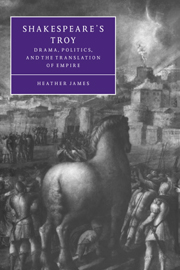Book contents
- Frontmatter
- Contents
- List of illustrations
- Acknowledgements
- Introduction: Shakespeare's fatal Cleopatra
- 1 Shakespeare and the Troy Legend
- 2 Blazoning injustices: mutilating Titus Andronicus, Vergil, and Rome
- 3 “Tricks we play on the dead”: making history in Troilus and Cressida
- 4 To earn a place in the story: resisting the Aeneid in Antony and Cleopatra
- 5 Cymbeline's mingle-mangle: Britain's Roman histories
- 6 “How came that widow in?”: allusion, politics, and the theater in The Tempest
- Notes
- Index
- Cambridge Studies in Renaissance Literature and Culture
2 - Blazoning injustices: mutilating Titus Andronicus, Vergil, and Rome
Published online by Cambridge University Press: 29 October 2009
- Frontmatter
- Contents
- List of illustrations
- Acknowledgements
- Introduction: Shakespeare's fatal Cleopatra
- 1 Shakespeare and the Troy Legend
- 2 Blazoning injustices: mutilating Titus Andronicus, Vergil, and Rome
- 3 “Tricks we play on the dead”: making history in Troilus and Cressida
- 4 To earn a place in the story: resisting the Aeneid in Antony and Cleopatra
- 5 Cymbeline's mingle-mangle: Britain's Roman histories
- 6 “How came that widow in?”: allusion, politics, and the theater in The Tempest
- Notes
- Index
- Cambridge Studies in Renaissance Literature and Culture
Summary
And now he writes to heaven for his redress.
See, here's “to Jove,” and this “to Mercury,”
This “to Apollo,” this “to the god of war”:
Sweet scrolls to fly about the streets of Rome!
What's this but libelling against the senate
And blazoning our injustice everywhere?
(4.4.13 –18)Trimming the laurels of triumph: poetic and political inscriptions
Titus Andronicus poses problems of response all the more vexed by the characters' habit of citing cultural authorities from Vergil and Ovid to Hecuba and Virginius for their gory exploits in rape, mutilation, and cannibalism. Also disturbing is Shakespeare's palpably felt hand in the play's learned butchery – he discursively re-enacts the physical violence performed by his characters – which critics generally chalk up to youthful exuberance and bad taste. Yet Shakespeare rivals, absorbs, and transforms the authorities of imperial Rome in a programmatic manner that has yet to be explained. His status as a relative newcomer to the London theatrical scene partly explains his aggressive stance toward classical models: by taking up violent, classically allusive drama, Shakespeare both joins and rivals Kyd and Marlowe in a collective struggle to transform the theater into a legitimate sphere of social influence. In Titus Andronicus, Shakespeare inaugurates his own artistic program to commandeer classical themes and events for the purposes of drama: when he manhandles the classical iconography generally reserved and polished for the court, he disturbs the normative uses for Roman authority and claims no small share of this authority for his theater. Titus Andronicus' aggressive imitations do nothing less than perform a critique of imperial Rome on the eve of its collapse and, in doing so, glance proleptically at Elizabethan England as an emergent nation.
- Type
- Chapter
- Information
- Shakespeare's TroyDrama, Politics, and the Translation of Empire, pp. 42 - 84Publisher: Cambridge University PressPrint publication year: 1997

